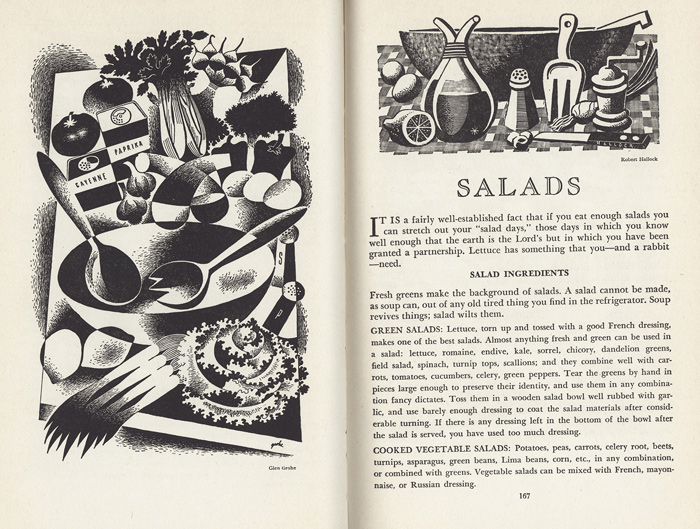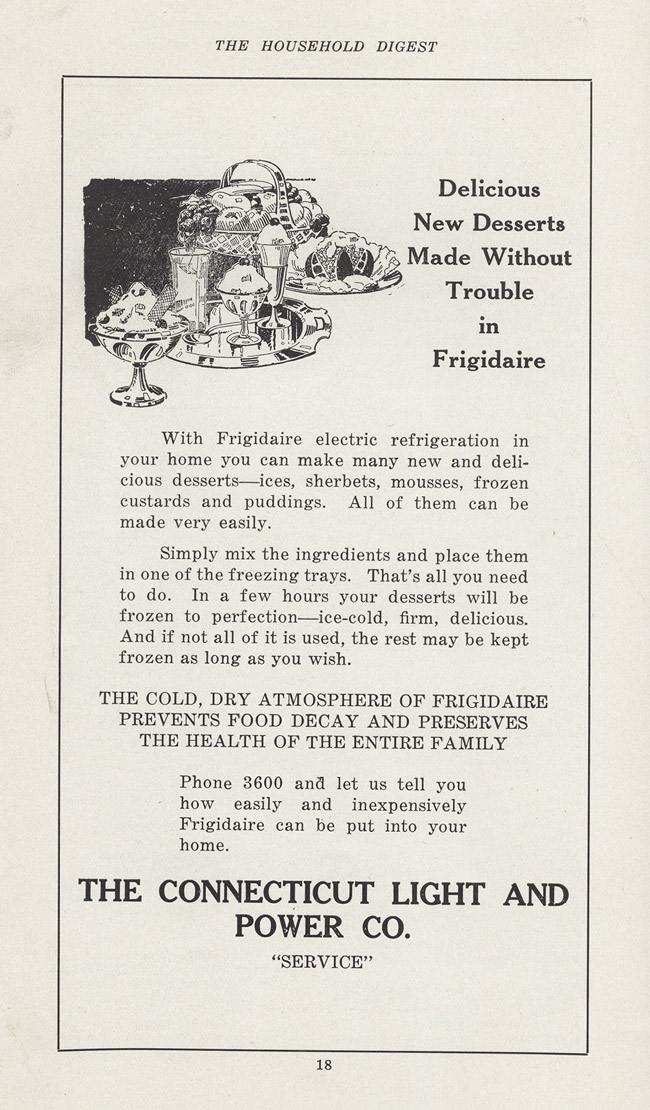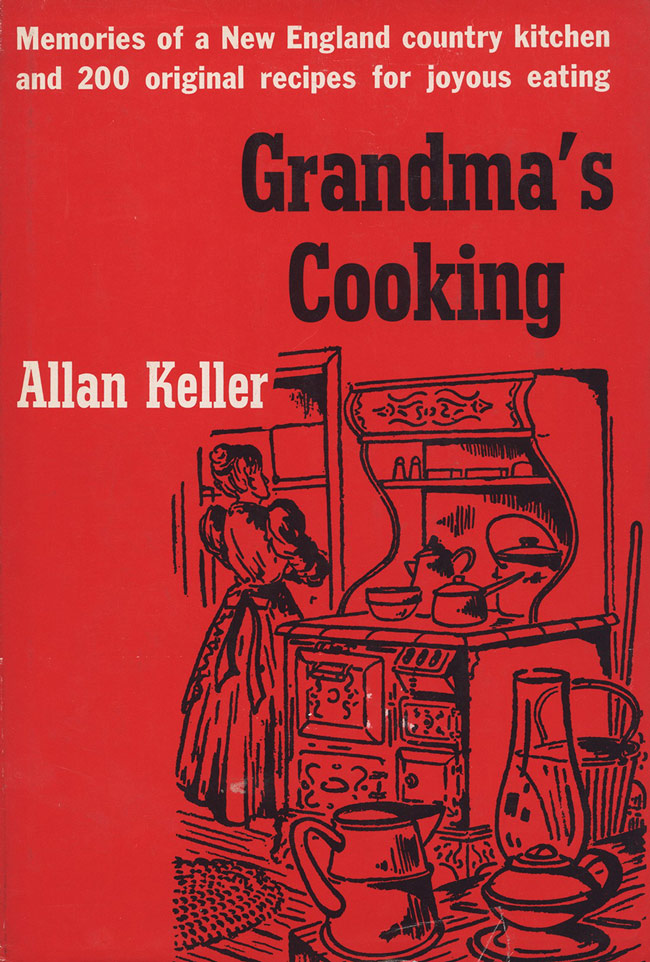The Huntington’s blog takes you behind the scenes for a scholarly view of the collections.
COOKBOOK COLLECTION | Grandma’s Cooking
Posted on Thu., May 16, 2013 by
Another post in a series from the cataloger of the Anne M. Cranston cookbook collection, which consists of approximately 4,400 British and American cookbooks from the 19th and 20th centuries. In this series, Shelley shares fascinating recipes, quotes, kitchen solutions, and anecdotes she has uncovered in the collection.
In his book Grandma’s Cooking (1955), Allan Keller wrote, “My grandmother was the best cook in the whole wide world.” While I would argue that mygrandmother was the best cook in the world, I do find it hard to take that away from Mr. Keller. After reading his tribute to his Connecticut Yankee Grandma, I will concede that she was an amazing woman and one heck of a great cook.
Not all of the cookbooks at The Huntington are simply collections of recipes. I have mentioned that some of the cookbooks cover everything from cheese-making to poultry keeping, but there is another type: a memoir or life of the cook with recipes mixed in. It is completely gratifying not only to read a story about how a town would almost mutiny if the dear lady brought anything but her peach pudding to the covered-dish suppers at the local church but also to then make the pudding for myself. I not only made it, I ended up buying the book.
Old Connecticut Peach Pudding
1 teaspoon vanilla
3 tablespoons butter
Grated rind on 1 lemon
¼ cup sugar
2 egg yolks
1 cup flour
¼ teaspoon salt
¼ teaspoon cinnamon
3 teaspoons baking powder
½ cup milk
10 large ripe peaches
1 ½ tablespoons lemon juice
¾ cup sugar
2 tablespoons sugar
2 egg whites, beaten stiff
Blend together vanilla, butter, grated lemon rind, ¼ cup sugar, and egg yolks. Beat thoroughly. Sift together flour, salt and baking powder and add alternately with milk to first mixture, beating well. Butter baking dish and fill bottom with peaches, which have been pealed, stoned, and quartered. Sprinkle with lemon juice. Then lightly mix in ¾ cup sugar. Pour pudding mixture over peaches and bake at 350° for 25 minutes. Remove from oven and cover with meringue made by slowly adding 2 tablespoons sugar to egg whites and beating until stiff. Dust with cinnamon and return dish to oven to brown meringue. This will take 15 minutes or longer if you prefer darker topping. Serve warm as is, or with cream.
Grandma Keller looked upon packaged foods and store-bought bread as if they had been concocted by the devil himself. She cooked 3 meals a day, 365 days a year until, as her grandson puts it, God called her up to cook for the angels. On the Connecticut farm there was no running water and no electricity. What couldn’t be canned was stored in the root cellar or in a bucket in the well just above water level.

Many other books from the collection round out the Connecticut menu, such as the New Connecticut Cookbook, which has a chapter on salads. From Woman’s Club of Westport (Westport, Conn.), compiler. New Connecticut Cookbook: Being a Collection of Recipes from Connecticut Kitchens.First edition. New York and London: Harper & Brothers Publishers, 1947.
Children did farm chores, went to school and church, and skated and fished over frozen ponds. The family butchered the animals and planted and harvested. At the end of the day, they all sat down to meals like pork roast with onion shortcake:
Pork Roast
1 loin roast of pork
1 tablespoon salt
1 large onion, sliced
1 teaspoon black pepper
3 tablespoon flour
Preheat oven to 450°. Wipe pork carefully with a clean damp cloth. Place meat on the rack of the roaster with fat side up. Rub in salt and sprinkle pepper and flour over meat. Lay onion slices on top and place in oven, uncovered. Cook for 15 minutes, then reduce heat to 325°. Cover roaster and bake until well done, allowing 25 minutes to the pound [Note: I personally like it cooked until the internal temperature is 160°]. During the last half hour of baking, remove the cover of the roaster so that the pork can become crisply browned.
Onion shortcake
2 cups onions, sliced thin
1 teaspoon salt
2 tablespoons butter
1 egg slightly beaten
½ cup sour cream
¼ teaspoon black pepper
Biscuit dough (see below)
Cook onions with salt and butter in saucepan in enough water to cover. When almost tender, but not browned, remove from fire and cool. Place biscuit dough (recipe below) about ½ inch thick in greased baking dish. Beat egg and cream and pepper together. Places onions on top of dough and pour cream mixture over all. Bake uncovered in hot oven (425°) for 20 minutes.
Buttermilk Biscuit Dough
2 cups sifted flour
2 teaspoons baking powder
¼ teaspoon baking soda
1 teaspoon salt
5 tablespoons butter
¾ cup buttermilk
Sift dry ingredients together. Work in butter with fork or fingers until finely mixed. Stir in buttermilk to make a soft dough. Put out on lightly floured board and knead slightly, just enough to shine up dough [do not overwork dough or biscuits will be tough]. Pat out to desired thickness.
Note: If cutting for regular biscuits, pat into 1-inch thickness and cut into desired rounds with lightly floured cutter. Place closely together in lightly greased baking pan. Bake in hot oven (475°) for 10 minutes, or until as brown as desired. This makes a high fluffy type of biscuit.
When he was young, Mr. Keller didn’t understand why people left the farm for the city. He eventually did just that and went on to be a commander in the U.S. Navy; a reporter, columnist, and city editor for the New York World-Telegram; and a professor at the Columbia University Graduate School of Journalism. He died at a much younger age than did his Connecticut farm grandparents. Perhaps there is something to be said about staying on the farm, but it is doubtful we would have heard about Grandma Keller if her grandson hadn’t ventured off of it.

Advertisement from Mothers' Guild, St. John's Episcopal Church (Waterbury, Conn.), compiler. Household Digest and Directory. Waterbury, Conn.: Mothers' Guild, St. John's Episcopal Church, ca. 1927.
In this post, I cited from Allan Keller’s Grandma’s Cooking (New York: Gramercy Publishing Co., 1955).
Shelley Kresan is a rare book cataloger in The Huntington’s technical services department.
